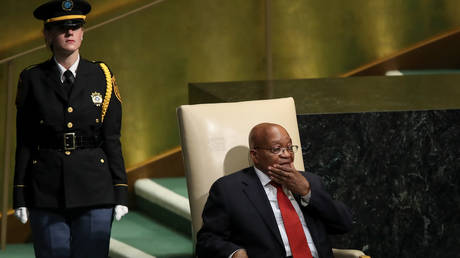..
Firm admits selling potentially tainted rocket fuel to NASA
The Texas company pleaded guilty to fraud and agreed to forfeit more than $250,000
Anahuac Transport Inc. has admitted to delivering potentially tainted rocket fuel to NASA and the Department of Defense (DOD) for rocket launches, according to the US Department of Justice.
The company’s representatives, Gary Monteau and Brant Charpiot, pleaded guilty to fraud on Wednesday and were banned from federal government contracting for two years.
As part of the plea deal, Anahuac Transport agreed to forfeit $251,401. The amount is comparable with the gross profits the company made from its fraudulent dealings.
Anahuac was contracted by NASA and the DOD to procure and transport fuel for the rocket launches from approximately 2012 through 2020.
The firm was required to ensure the tanker trailer it used did not previously contain chemicals that may have adverse reactions with the fuel. However, the tankers had in fact previously contained such substances, and the documents were falsified to claim that they had not.
Elon Musk’s Space Explorations Technologies Corp. (SpaceX) was among the firms receiving the potentially tainted fuel, the DOJ said. The SpaceX contract saw Musk’s firm deliver supplies for the International Space Station and with military payloads.
A sentencing date has been set for May 12. Anahuac could be hit with a $500,000 fine and serve up to five years of probation.
So, they cannot contract with the government for 2 years, and they may go to jail for 5 years. Does that mean they can contract with the government for 3 years while in prison?
I'm being facetious, of course, but it seems to me the potential for dramatic catastrophe should eliminate people who are willing to risk the deaths of astronauts, from ever being allowed back in such a position.
===========================================================================================
Hunter Biden’s partner gets prison sentence
Biden’s Burisma board colleague sentenced to prison for securities fraud
Devon Archer, who sat on the board of Ukrainian gas company Burisma with Hunter Biden (pictured, August 2020), has been sentenced to prison in a fraud case © Getty Images/Handout
Devon Archer, a close friend and former business partner of President Joe Biden’s son Hunter, was sentenced on Monday for defrauding a Native American tribe. A federal judge in New York said Archer may go to prison for a year and a day, as well as serve one year of probation and forfeit $14 million in property.
Archer gained notoriety when it emerged he introduced Hunter Biden – his partner at Rosemont Seneca – to the Ukrainian gas company Burisma back in 2014.
Both Archer and Biden sat on Burisma’s board of directors for years, reportedly being paid over $83,000 a month.
Of course, Biden has no expertise in the gas business, however, he does have access to his father.
Monday’s sentence is not related to the Ukrainian gas deals, however, but the June 2018 conviction for conspiracy and securities fraud, over Archer’s role in a bond scheme to defraud an Oglala Sioux tribe to the tune of tens of millions.
Archer and two other defendants conspired to have the Wakpamni Lake Community Corporation issue a series of tribal bonds and defrauded both the tribe and the buyers of the bonds while pocketing the profits, the court said in 2018. Archer and another defendant had used the bonds to meet capital requirements in broker deals, and used the profits to buy companies “as part of a strategy to build a financial services conglomerate,” according to the Department of Justice.
On Monday, Judge Ronnie Abrams said the crime was too serious to avoid prison time, but cut the sentence down from the 30 months requested by prosecutors, reportedly citing the Covid-19 pandemic as the reason. He also ordered a one-year probation rather than the requested three years. The US government may also seize up to $14 million in assets owned by Archer as restitution to the tribe.
Abrams also gave Archer 60 days to report to prison, but then said he would set a new surrender date pending appeal.
Archer has appealed the sentence all the way to the US Supreme Court, without success. In November 2021, it emerged that Archer had requested – and Judge Abrams had granted – permission to go on over 40 international trips since his indictment and even conviction.
Former president referred for criminal probe
Former South African leader Jacob Zuma and serving minister Gwede Matashe
potentially face graft charges
© Drew Angerer / Getty Images
A South African corruption inquiry investigating allegations of graft during Jacob Zuma’s time in power, has referred the former president and incumbent mineral resources minister Gwede Mantashe for criminal investigation.
The inquiry made the recommendation after a three-year investigation into Zuma’s administration, with the latest report focused on allegations of corruption and fraud regarding a privately-owned company, Bosasa.
“The evidence revealed that corruption was Bosasa’s way of doing business,” the inquiry alleged, accusing the company of having “bribed politicians, government officials, President Jacob Zuma and others extensively.”
Zuma is accused by the inquiry of having passed the company confidential information about criminal investigations into Bosasa, helping to hinder criminal prosecutions in return for bribes. If those allegations prove true, it would mean Zuma violated his obligations under the South African constitution.
Mantashe was also referred for criminal investigation, with the inquiry claiming a criminal probe would lead to a corruption case against him. Bosasa reportedly installed security systems at three properties owned by Mantashe at no cost, which, the inquiry claims, was an attempt to build favor with the then-Secretary General of the ruling African National Congress (ANC). Mantashe admitted the security systems had been installed but claimed nothing was inappropriate about the arrangement.
Bosasa is currently in voluntary liquidation, after banks closed its accounts over the graft allegations.
Zuma denies any wrongdoing and has refused to cooperate with the inquiry, resulting in him being sentenced to 15 months in prison for contempt of court. He was released on medical parole in September but was later ordered back to prison by the High Court. Zuma is currently appealing the order to return to jail.
The inquiry further called for an investigation into ANC officials who, free of charge, arranged an election “war room” for Bosasa. The ANC has not immediately responded to the recommended investigation.
Cambodian court convicts opposition leaders in mass trial
By Thomas Maresca
Exiled Cambodia opposition leader Sam Rainsy was among 21 defendants convicted in a Phnom Penh court
in a verdict rights groups have called politically motivated. File Photo by Mast Irham/EPA-EFE
March 17 (UPI) -- A Cambodian court convicted 21 people, including exiled opposition leader Sam Rainsy, on charges including conspiracy to overthrow the government in a decision Thursday that defendants and rights groups blasted as an effort to sideline opponents of strongman Prime Minister Hun Sen.
The Phnom Penh Municipal Court imposed sentences of 10 years to Rainsy and six other senior leaders of the opposition Cambodia National Rescue Party, all of whom were tried in absentia, local news site VOD reported.
Thirteen party activists who were present in court received sentences of five years. One other defendant was given a suspended five-year sentence.
Rainsy, who resides in France, left Cambodia in 2016 to avoid charges that included defamation of Hun Sen, who has held onto power since 1985.
Most of the charges in Thursday's decision revolved around Rainsy's plan to return to Cambodia in 2019, which prosecutors argued was part of a plot to topple the government.
Defendants in court shouted that they were innocent as the verdict was read, while a group of supporters clashed with guards outside the courthouse, VOD reported.
Rights groups were quick to slam the decision as another abuse of power by the Hun Sen government, which has intensified its suppression of political opposition in recent years.
"The mass trial and convictions of political opponents on baseless charges is a witch hunt that discredits both the Cambodian government and the country's courts," Phil Robertson, deputy Asia director at Human Rights Watch, said.
"Cambodia's politicized courts have facilitated Prime Minister Hun Sen's effort to destroy the last remnants of democratic freedoms and civil and political rights in the country," Robertson said.
Cambodian authorities cracked down on opposition politicians, civil society groups and independent media in the run-up to a scheduled 2018 election. The country's high court ultimately dissolved the Rainsy-founded CNRP, allowing the CPP to run virtually unopposed in an election roundly condemned by international observers.
Western nations including the United States responded with targeted sanctions and visa restrictions, while the European Union ultimately revoked Cambodia's duty-free access to its markets over its worsening rights situation.
Thursday's decision was the second in four mass trials of more than 150 individuals connected to the CNRP.
"The justice system has again been used as a blunt political tool in an attempt to quash opposition to Hun Sen's dictatorship," Rainsy wrote on Twitter after the verdict was announced. "Opposing dictators is a duty, not a crime."
Honduran judge grants U.S. request to extradite former president
By Darryl Coote
An Honduras judge late Wednesday accepted the request to extradite former President Juan Orlando Hernandez
to the United States. Photo by Gustavo Amador/EPA-EFE
March 17 (UPI) -- A judge in Honduras late Wednesday approved the extradition of former President Juan Orlando Hernandez to the United States where prosecutors have accused him of being involved in a narco-trafficking conspiracy.
The Central American nation's Supreme Court of Justice said in a statement that an unnamed judge granted the extradition of the former president "after evaluating the means of evidence presented" by the Court of the Southern District of New York.
Hernandez has three days to file an appeal, the court said.
Until he is extradited, Hernandez will remain detained by the Honduran authorities where he has resided since turning himself over to police on Feb. 15. at the request of the United States.
The former president has been accused by U.S. prosecutors of being involved in narco-trafficking scheme, specifically accepting brides from individuals seeking protection from law enforcement to smuggle drugs into the United States.
The Honduras Supreme Court of Justice said he faces a charge of conspiracy to import a controlled substance into the United States and two firearms-related charges.
The announcement of the extradition follows U.S. Secretary of State Antony Blinken revealing last month that Hernandez had quietly been added to a list of dozens of former Central American officials barred from entering the United States over accusations of committing corruption.
At the time, Blinken said there were credible reports that the former president was involved in "significant corruption" and that he used the proceeds from narco-trafficking to fund his political campaigns.
The U.S. prosecutors also convicted Juan Antonio "Tony" Hernandez" in 2019 on trafficking charges in a case that listed his brother, the former president, as a co-conspirator. He was sentenced in March of last year to life in prison.
Hernandez was president of Honduras from 2014 to January when President Xiomara Castro was inaugurated.




























